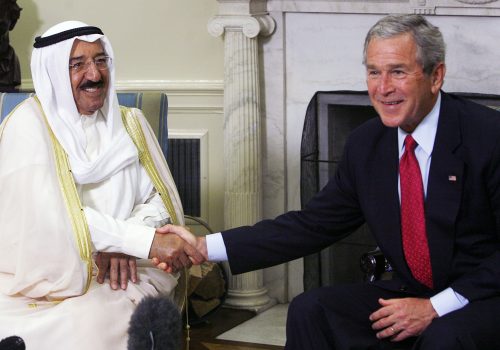November 18, 2020
Kuwait’s fiscal crisis requires bold reforms
In October 2018, in a speech marking a new session of the country’s National Assembly (parliament), the late emir of Kuwait, Sheikh Sabah Al-Ahmad Al-Sabah, urged parliamentarians not to obstruct an important path of economic reform by a temporary improvement in oil prices to “protect future generations” from an erosion of Kuwait’s vast wealth.
The late Sheikh’s comments were in reference to Kuwait’s long-running addiction to oil income and the perennial infighting between the executive and legislative branches of government, which have paralyzed efforts to diversify the economy away from oil and address other structural imbalances in the economy—from the state’s dominance as the employer of choice among Kuwaitis to the runaway costs of an expansive welfare system.
Kuwait is unique among its Gulf Cooperation Council (GCC) peers for having a vibrant parliamentary life, with elected lawmakers wielding power to challenge the will of appointed government ministers. While this allows for greater civic participation, it has hindered decision-making around sorely needed fiscal adjustments and the implementation of any meaningful diversification plans.
Kuwait’s sensitivity to oil-price volatility is more pronounced than in any of the other hydrocarbon-dependent GCC countries. Over the past decade, oil income averaged 90 percent of total revenues, accounting for 50 percent of GDP and more than 90 percent of Kuwait’s exports. Therefore, among major oil exporters, Kuwait has acutely felt the impact of the double shock of the coronavirus pandemic: depressed global energy demand and the Russia-Saudi Arabia price war induced-crash in oil prices in the first quarter of the year.
In October, the International Monetary Fund (IMF) projected that Kuwait’s economy would shrink by 8.1 percent in 2020, down from a previous April forecast of a 1.1 percent contraction, mainly on the worsening outlook for oil prices.
Current spending is a drag on development
Given that non-oil investment is primarily driven by government spending, lower oil prices tend to put a brake on growth-enhancing investments in areas such as infrastructure, depriving the Kuwaiti economy of important multiplier effects that would stimulate the private sector. Long-term underinvestment in infrastructure is a symptom of the overwhelming fiscal burden that current expenditure represents for Kuwait’s budget. Public sector salaries, allowances, and subsidies consume over 70 percent of the total budget, with public wages and benefits accounting for one-third of it alone.
Higher wages, guaranteed employment, and shorter working hours combine to form a powerful incentive for Kuwaitis to choose public over private sector employment. The state hires some 80 percent of Kuwaitis. Therefore, curtailing the public wage bill and phasing out inefficient, generalized subsidies would make greater fiscal resources available for higher capital spending aimed at promoting growth and job creation in the non-oil sector.
Higher spending on capital-intensive projects would help address long-running under-investment in Kuwait’s infrastructure, which lags its GCC peers and leads, among other things, to occasional electricity blackouts. In the World Economic Forum’s Global Competitiveness Report 2019, Kuwait is ranked sixty-sixth out of 141 countries in terms of its infrastructure quality, a decline from the previous year. Excessive red tape, symptomatic of a large public sector bureaucracy, has contributed to Kuwait’s poor project-delivery record in the infrastructure sector, where delays and cost overruns are commonplace in implementing projects.
This was exemplified by the Kuwait Port Authority’s decision to shelve the $6.5 billion Mubarak Al-Kabeer port project on Boubiyan Island, off the coast of Iraq, which had been a centerpiece of Kuwait’s Vision 2025 push to diversify the economy. Located in the undeveloped northern region of Kuwait, the port is part of the $86 billion Silk City project that includes eleven other maritime transport, logistics, and tourism projects that were touted as central to the country’s economic diversification plans. The suspension of work on the Mubarak Al-Kabeer port, which was scheduled to be operational by 2019, represents a slowdown of non-oil investments and underscores the need for better project selection, planning, and implementation.
Political infighting has obstructed reform
As a result of low oil prices, the budget for fiscal year 2020-2021 projects a halving of revenues, creating a $46 billion deficit. In August, Finance Minister Barak Al-Sheetan warned parliament that Kuwait’s Treasury does not have enough cash to cover state salaries beyond October (though this did not materialize). In the continued absence of legal authorization to issue debt or draw on the sovereign wealth fund assets held in the Future Generations Fund (FGF), Kuwait has rapidly depleted the General Reserve Fund—the government’s main liquidity buffer—to fund the budget.
Unlike other Gulf states, which have borrowed on international debt markets to finance their deficits, Kuwait has been unable to tap international investors because parliament has refused to renew a debt law that expired in 2017. The legislative assembly justifies their reasoning on the grounds that they have yet to see plans to reform the economy and shift its heavy reliance on oil. A string of corruption scandals, including one that forced the government to resign last year, has also deepened parliament’s mistrust of the government’s financial management, hardening lawmakers’ stance that the government should end graft before accumulating more debt. With National Assembly elections set for December, parliamentarians will be keen to appear tough on corruption and committed to shielding public sector wages and benefits from any government proposals to curb spending.
Parliament is equally opposed to tapping the FGF, the world’s fourth-largest sovereign wealth fund at an estimated $550 billion, as a means of plugging the funding shortfall. As its name implies, the FGF is a savings vehicle intended to secure the well-being of future generations of Kuwaitis. Therefore, drawing down on the FGF, which has only happened once during the first Gulf War, is a controversial proposition and requires legal authorization from parliament. In September, citing a “significant escalation in the brinksmanship” between the two government branches—specifically on the debt deadlock—Moody’s, the credit rating agency, downgraded Kuwait’s rating for the first time. In the absence of near-term debt-raising, Kuwait’s elevated liquidity stress risks additional credit downgrades, increasing the government’s borrowing costs in any future international bond sale.
The constitutional backdrop of Kuwait’s fiscal crisis
While Kuwait needs to borrow to avoid running out of cash, skirting fiscal reform while relying solely on debt-raising would dramatically increase Kuwait’s debt burden amid a worsening outlook for oil prices, eroding Kuwait’s long-term ability to service a mounting debt pile. The IMF estimates that government debt must rise to over 74 percent of GDP by 2025 from the current 12 percent in order to close financing needs over the medium term. Moody’s projects that Kuwait would need $90 billion in debt to meet the government’s funding needs between the current fiscal year and the fiscal year that ends in March 2024. This underscores the importance of reining in current spending.
However, according to Kuwait’s constitution, the government is obliged to employ citizens, amplifying the challenge of containing public employment growth—the leading contributor to Kuwait’s fiscal pressures and a key priority of fiscal adjustment. This makes the private sector crucial in absorbing most of the one hundred thousand Kuwaiti nationals—22 percent of the current Kuwaiti labor force—expected to enter the job market in the next five years.
Private enterprise faces constraints
In the World Banks’ Doing Business Report 2020, Kuwait was among the world’s top ten improvers amongst 190 economies, thanks to a slew of reforms spanning seven out of ten of the index’s constituent pillars. However, it still has some very weak rankings, such as trading across borders (162nd) and getting credit (119th). Compared to other Gulf countries, Kuwait’s overall ranking of eighty-three is lower than the United Arab Emirates (sixteenth) and Qatar (seventy-seventh). Factors limiting private enterprise growth include the state’s dominant role in the economy, slow decision-making around large contract awards, and the difficulty of competing against deeply entrenched local players in many sectors.
In March, the cabinet approved a fiscal support package in response to the COVID-19 crisis, totaling $1.6 billion, that focused on protecting public sector wages, largely overlooking Kuwait’s private sector. A delayed $780 million package, passed only in July, targeted the roughly 77,000 Kuwaitis employed in the private sector. However, this was not enough to prevent 45 percent of Kuwaiti business owners from suspending or shutting down their companies. The government’s inadequate support for businesses during the coronavirus downturn is a setback for already anemic job creation in the private sector and has reinforced the incentives that motivate Kuwaitis to favor public sector employment.
New leader faces a fiscal reckoning
Given that passing deep economic reform in an election year is highly unlikely, an urgent priority for Kuwait’s new emir, Sheikh Nawaf Al-Ahmad Al-Sabah, and its Crown Prince, Sheikh Meshal Al-Ahmad Al-Sabah, is to work with parliament to agree on a mechanism for securing bridge funding for the budget. The thankless task of softening lawmakers’ resistance to controls on the public wage bill will likely fall to the Crown Prince, who has traditionally been responsible for managing the relationship between the government and the National Assembly.
As a newly anointed emir, Sheikh Nawaf is unlikely to push for politically toxic reductions to subsidies and public sector employment, for fear of sparking popular resentment. However, as Kuwait depletes its liquid assets and the value of its oil exports deteriorate, the failure to implement fiscal reform and diversify the economy will force Kuwait to draw from its rainy-day fund—the FGF—far sooner than has been anticipated, jeopardizing the well-being of future generations of Kuwaitis.
Ahmed Helal is an independent economic and political analyst who specializes in the Middle East and North Africa.
Image: Kuwait's new Emir Nawaf al-Ahmad al-Sabah holds a paper as he takes the oath of office at the parliament, in Kuwait City, Kuwait September 30, 2020. REUTERS/Stephanie McGehee


